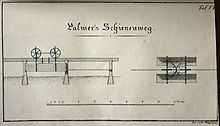Henry Robinson Palmer

Henry Robinson Palmer (1795–1844) was a British civil engineer who designed the world's first monorail system and the first elevated railsystem
Palmer writes in the study presenting his system: "the charge of carrying the raw material to the manufacturing district, and the manufactured article to the market, forming no small proportion of its price to the consumer.[...] The leading problem in our present subject is, to convey any given quantitiy of weight between two points at the least possible expense.[...] In order to retain a perfectly smooth and hard surface, unencumbered with extraneous obstacles to which the rails near the ground are exposed, it appeared desirable to elevate the surface from the reach of those obstacles and at the same time be released from the impediments occasioned by snows in the winter season"[1]
Palmer made his patent application for his design in 1821: an elevated single rail supported on a series of pillars in an ordinary distance of ten feet, inserted into conical apertures in the ground, with carriages suspended on both sides, hanging on two wheels the one placed before the other. A horse is connected to the carriage with a towing rope, proceeding on one side of the rail on a towing path.
The first horse-powered elevated monorailway started operating at Cheshunt on June 25, 1825. Although originally designed to transport materials, it was here used to carry passengers.[2]
1826 German railway pioneer Friedrich Harkort had a demonstrational track of Palmer's system built by his steelfactory in Elberfeld, one of the main towns in the early industrialised region of Wupper Valley.
Palmer's monorail can be regarded as the precursor of the Schwebebahn Wuppertal and of the Lartigue Monorail system.
Palmer was one of three young engineers key to the founding of the Institution of Civil Engineers in 1818.
In his study, Palmer describes as one of the first the principle of containerisation: "The arrangement also enables us to continue a conveyance by other means with very little interruption, as it is evident that the receptacles may be received from the one, and lodged on to another kind of carriage or vessel separately from the wheels and firame work, without displacing the goods;"
See also
Literature
References
- ↑ Henry R. Palmer. Palmer's Observations on Railways / Description of a Railway on a New Principle. J.Taylor, London, 1823. pp. 1, 2, 33, 34–35. Retrieved 2001-11-20.
- ↑ monorails.org